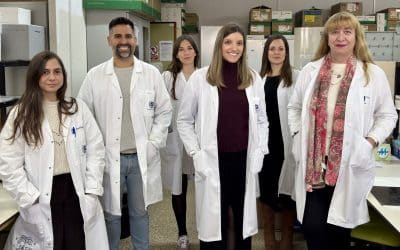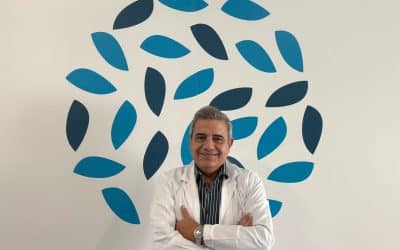- This is a recent high-impact article in which a novel proposal is made on the use of new drugs, in addition to leading a clinical trial on one of them, olezarsen.
- This work was one of the last high-level publications of the recently deceased Dr. Pedro Valdivielso, who was vice-director of the Institute, professor at the UMA and specialist in Internal Medicine at the hospital.
Professor Pedro Valdivielso and Dr. Inmaculada Coca, professionals from the Biomedical Research Institute of Malaga and Platform in Nanomedicine (IBIMA Plataforma BIONAND) and the University Hospital Virgen de la Victoria, in collaboration with the University of Malaga (UMA), have recently published an article in a prestigious scientific journal such as 'CellPress' about their perspective on the treatment of people with extremely high levels of triglycerides in the blood.
Triglycerides are a type of fat that circulates in our blood. Although at normal levels they are necessary for the body to function, when they accumulate in excess, in the form of large particles - chylomicrons - they can become dangerous. People with very high levels of triglycerides - chylomicronemia - are at high risk of suffering attacks of acute pancreatitis, a very painful and potentially fatal inflammation of the pancreas.
The scientists involved in this work review the causes and consequences of severe elevation of triglycerides, explaining that in most cases they are due to other factors such as obesity or diabetes -multifactorial chylomicronemia-; these patients being predisposed to an increased risk of cardiovascular disease and pancreatitis.
These cases usually respond to diet, control of these factors and drugs such as fibrates or omega-3 derivatives. On the other hand, there is a rare disease -familial chemomicronemia-, due to genetic defects that prevent the degradation of triglycerides, associated with a high incidence of pancreatitis from a very early age. Until only two years ago, the treatment options in this process were limited - strict diet, very low in fat -, which made the management of the disease very difficult.
In this article, the authors review the trials carried out with new therapies for this rare disease -Volanesorsen, Olezarsen-, highlighting the excellent safety profile of the latter. These drugs act, among other mechanisms, by reducing the production of a protein called apolipoprotein C-III (apoC-III). This protein plays a key role in fat metabolism, and its inhibition allows triglycerides to be degraded more efficiently, thus reducing their accumulation in the form of chylomicrons in the bloodstream.
Complementary to diet, these therapies can not only reduce triglyceride levels by up to 70%, but, with the contribution of additional mechanisms to the above-mentioned -not fully known-, they drastically reduce the incidence of pancreatitis. In this sense, they present the experience of their group with volanesorsen in a young patient with one of these genetic defects, and multiple previous admissions for episodes of pancreatitis who, independently of the reduction of triglycerides -less than 5%, due to the difficulty of following the diet-, presented only one episode of pancreatitis during a year of treatment, interrupted when the required reduction in the level of triglycerides -at least 25%- was not reached, according to the protocol approved by the National Health System.
It is precisely because of this case, and the reduction in the incidence of pancreatitis observed in the pivotal trial with olezarsen (BALANCE trial), that the authors propose, in view of the authorization of its use by the regulatory authorities, that not only the objective of reducing triglycerides should be considered, but also the reduction in the incidence of pancreatitis, its most serious consequence. This would make it possible to continue treatment in patients who, due to the great difficulty of following such a strict diet -less than 20 grams of total fat per day-, do not achieve the required reduction in TG levels and, nevertheless, can benefit from a drastic reduction in their episodes of pancreatitis.
In addition, Dr. Inmaculada Coca has stated that “this proposal, to which the rest of the colleagues of the research group adhere, arose from Dr. Valdivielso's concern to solve the problems of these patients with rare diseases, recognizing a magnificent legacy of Dr. Valdivielso, whose example is still alive in the memory of his group”.
On the other hand, the benefit observed with these drugs in patients with very high triglyceride levels has led to the launching of new trials aimed not only at this rare genetic disease. In this sense, Dr. Coca is currently leading the phase III clinical trial IONIS CORE, with Olezarsen, in collaboration with colleagues from the Lipid Unit of the Virgen de la Victoria University Hospital, aimed at patients with high triglyceride values - multifactorial chylomicronemia - with the objective of reducing not only the risk of pancreatitis but also that of cardiovascular disease.
The Institute's researcher, and specialist in Internal Medicine, explained the importance of these advances, highlighting that treatment with olezarsen could become an accessible and well-tolerated option for these patients, improving their prognosis and reducing the risks associated with the accumulation of triglycerides in the blood.
Finally, Dr. Coca, together with the other members of the research group, would like to take advantage of the publication of this article to pay posthumous tribute to Professor Pedro Valdivielso, expressing their gratitude and recognition to the man who has made a decisive contribution to the development of innovative treatments for lipid-related diseases, which affect a significant number of people worldwide.
Referencias
Valdivielso P, Coca Prieto I. Apolipoprotein C-III, familial chylomicronemia syndrome, and olezarsen. Med. 2024 jun 14;5(6):493-494. doi: 10.1016/j.medj.2024.05.004. PMID: 38878767.
Ministerio de Sanidad. Protocolo farmacoclínico del uso de Volanesorsen en el tratamiento del síndrome de quilomicronemia familiar en el Sistema Nacional de Salud. Disponible en en:https://www.sanidad.gob.es/areas/farmacia/infoMedicamentos/valtermed/docs/20220715_Protocol_farmacoclinico_VOLANESORSEN_SQF.pdf
Raúl J. Andrade Bellido, es Investigador Responsable del grupo consolidado ‘Hepatogastroenterología, Farmacología y Terapéutica Clínica Traslacional’ de IBIMA Plataforma BIONAND, Catedrático y Director del Departamento de Medicina en la Facultad de Medicina de la Universidad de Málaga, Jefe de Servicio Aparato Digestivo del Hospital Universitario Virgen de la Victoria en Málaga. Además, es el Responsable del Grupo Español de Hepatopatias asociadas a medicamentos (Spanish DILI Registry), el Coordinador de la Red Ibero-Americana de Hepatopatías asociadas a medicamentos (SLATINDILI) y también del Registro europeo de Hepatopatías asociadas a Medicamentos (Pro-Euro DILI Registry). Chair de la COST Action CA17112 – Prospective European Drug-Induced Liver Injury Network (PRO-EURO DILI NET) y del EASL DHILI Consortium. Horizonte2020. Framework Programme (European Union).



